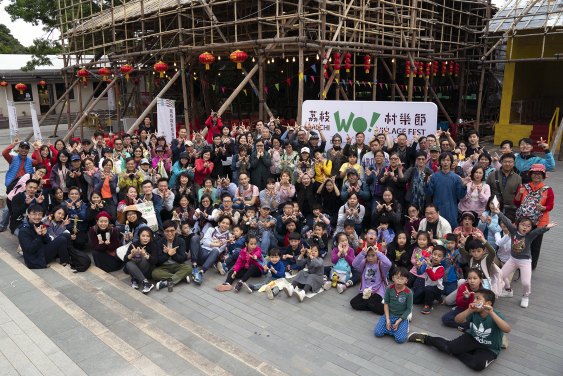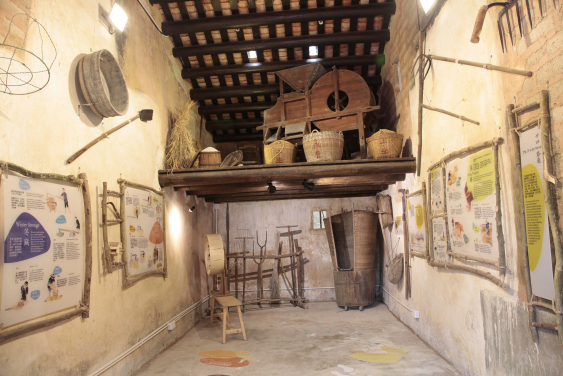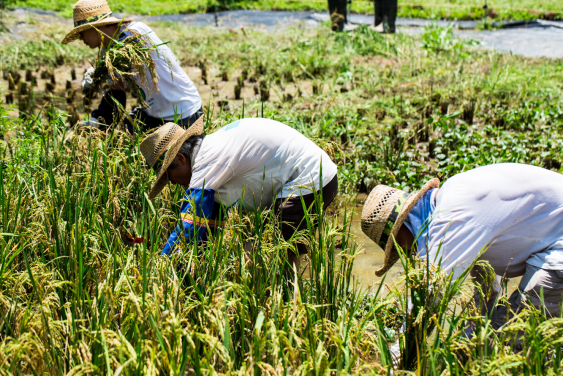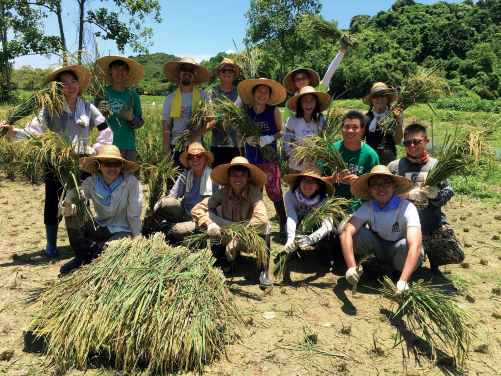Media
HKU Rural Sustainability Programme wins inaugural Special Recognition for Sustainable Development in the 2020 UNESCO Asia-Pacific Awards for Cultural Heritage Conservation
21 Dec 2020

HKU Rural Sustainability Programme wins inaugural Special Recognition for Sustainable Development in the 2020 UNESCO Asia-Pacific Awards for Cultural Heritage Conservation

Annual Village Festival is a community co-created event to celebrate the revitalisation of LCW. As a village branding event, the activities were carefully designed for participants to experience the vibrancy of the Hakka village. (photo credit: Centre for Civil Society and Governance)

A row of dilapidated village structures and their front yards located at the east entrance was restored into Lai Chi Wo Culture Hub in 2015. The restored complex is now a shared-use space for multiple purposes such as: project information display and thematic exhibitions. (photo credit: Centre for Civil Society and Governance)

The revitalisation of Lai Chi Wo is a co-creation and collaborative process engaging different stakeholders. Through community collaboration, a sense of stewardship towards rural cultural landscape is re- established. (photo credit: Centre for Civil Society and Governance)

Sustainable cultivation and processing trials of ginger and turmeric were initiated. Two village-based brands were created by the community members to promoting different “Made in LCW” products to the consumers in the wider Hong Kong society.(photo credit: Centre for Civil Society and Governance)

The current LCW community is formed of Indigenous villagers, newly settled farmers and volunteers. Different community groups and individual citizens outside the village were engaged in the Project. They contribute to the adaptive creation of the landscape that ensure cultural continuum and spirit of the place. (photo credit: Centre for Civil Society and Governance)
The University of Hong Kong (HKU), Pui Shing Tong of Lai Chi Wo Village, and HSBC are proud to announce that Lai Chi Wo Rural Cultural Landscape has received the inaugural Special Recognition for Sustainable Development in this year’s UNESCO Asia-Pacific Awards for Cultural Heritage Conservation.
The award application is built on “HSBC Rural Sustainability Programme” (the Project) which is initiated and implemented by the Centre for Civil Society and Governance (CCSG) at HKU since 2013 with full support from the Lai Chi Wo Village and HSBC. The achievement marked the advancement of the Project in building an innovative rural sustainability model that sets a benchmark for Hong Kong and beyond.
The award is a due recognition of the collaborative efforts of many individuals and organisations who share a strong commitment to sustainability and are undaunted to act on the commitment. On behalf of the project team, CCSG Director Professor Wai-Fung LAM remarked that “The Lai Chi Wo model takes the interweaving relationships between the social and ecological systems seriously; its success demonstrates the power of a collaborative approach to rural sustainability.”
The consortium proudly shares the honour and joy with our project partners Hong Kong Countryside Foundation, The Conservancy Association, Produce Green Foundation, and the Environment Bureau of HKSAR Government.
Secretary for the Environment Mr. WONG Kam-Sing congratulates the project team and said: “I would like to offer my sincere congratulations to the team of the University of Hong Kong (HKU) on winning the prestigious Special Recognition for Sustainable Development in the 2020 UNESCO Asia-Pacific Awards for Cultural Heritage Conservation for the sustainable rural revitalisation project at Lai Chi Wo. The team together with villagers have spared no effort in the revitalisation work in the concerned remote countryside. As a model of excellence with influence, the project has fostered the momentum of revitalising remote countryside to radiate progressively in the vicinity. The Countryside Conservation Funding Scheme of the Environment Bureau / Environmental Protection Department has also approved about HK$15 million this year to support the Centre for Civil Society and Governance of HKU to carry out forest village ecosystem management in Mui Tsz Lam and Kop Tong adjacent to Lai Chi Wo. We look forward to enhancing the urban-rural symbiosis and furthering collaboration with the HKU team and locals on remote countryside revitalisation in the future.”
Ms. Diana CESAR, Chief Executive, Hong Kong, HSBC, said: “Integrating sustainability into cultural heritage conservation is important to advancing the application of global United Nation’s Sustainable Development Goals agenda. We have supported the ‘HSBC Rural Sustainability Programme’ to foster sustainable innovation and promote rural sustainability since its launch in 2013. The partnership with the University of Hong Kong brings together our combined economic, social and environmental expertise and we are proud that the results of this collaborative approach have been recognised by UNESCO. We will continue to work with the community to support the sustainable transition for our future generations.”
UNESCO introduced the new Special Recognition for Sustainable Development in 2020 together with an updated set of Awards Criteria to acknowledge more prominently the role and contribution of cultural heritage to sustainable development within the broader framework of Agenda 2030. The Special Recognition acknowledges outstanding projects that demonstrate noteworthy achievement in all criteria and have a significant impact in contributing to sustainable development. The jury selected Lai Chi Wo Rural Cultural Landscape project as one of the two winners of the inaugural Special Recognition for Sustainable Development among the 48 entries from nine countries from the Asia-Pacific region this year. The Jury applauded the project’s pioneering approach to rural sustainability which “upholds the key dimensions of sustainable development – economic, social and environmental – in undertaking the holistic rejuvenation of the historic Hakka agricultural settlement using nature-based solutions.”
Village Representative Mr. TSANG Wai-Yip, on behalf of Pui Shing Tong, the Lai Chi Wo Village Committee, thanked all those who have offered help in revitalising Lai Chi Wo, “I am very happy that the collaboration between indigenous villagers, HKU and various organisations in Lai Chi Wo Village over the years was well recognised. It has successfully rejuvenated the abandoned village back to life. We hope this award could encourage other villages to pursue sustainable rural development in the future.”
Looking at rural area as a social-ecological system in which human interactions are intertwined with the environmental dynamics, the Lai Chi Wo revitalisation model embraces the principles of interdisciplinarity (drawing upon different expertise and bodies of knowledge), collaboration (engaging with different communities of interest in and beyond the rural area), innovation (co-creating novel solutions to social and environmental challenges), and resilient development (continually nurturing social ventures and collective actions across scales and scopes to cope with the changing environment).
Dr. Sarah LIAO, Chairlady of the Project’s Steering Committee, also one of the founding members of the Project, said: “The Lai Chi Wo rural sustainable village transformation gives us a glimpse into the garden of Eden where all living things flourish together and there is hope.”
HKU President and Vice-Chancellor Professor Xiang ZHANG said: “The Lai Chi Wo project is a fine example of how research can inform policy actions to create social impact; and how practical experiences can enrich academic pursuits. UNESCO's recognition of our achievements at Lai Chi Wo reaffirms the University’s commitment to the United Nations Sustainable Development Goals. We will continue to work closely with keen players in Hong Kong and the Asia-Pacific region to achieve a sustainable society”.
The success of the Project has also leveraged new resources and support from the HKSAR Government’s Environment and Conservation Fund which provides long-term biodiversity monitoring of Lai Chi Wo’s diverse habitats; and the Hong Kong Jockey Club Charities Trust under the Chief Executive’s Community Project.
The next step for the revitalisation effort is to scale up its impact by transferring the nature-based solutions knowledge and experience to other villages in Hong Kong and elsewhere in the Asia-Pacific region - to protect, manage, and restore natural or modified ecosystems that tackle societal challenges, including land degradation and biodiversity loss. Besides expanding the Lai Chi Wo impact to the nearby villages Mui Tsz Lam and Kop Tong with a village cluster approach, there is also a regional engagement strategy in place to work with international agencies and universities in the Asia-Pacific region to establish a network of partnerships incubating knowledge, ideas and actions for urban and rural sustainability. The winning of the UNESCO award provided a solid foundation for the regional engagement initiative.
About the UNESCO Asia-Pacific Awards for Cultural Heritage Conservation
The UNESCO Asia-Pacific Awards for Cultural Heritage Conservation programme was established in 2000 to recognise efforts of private individuals and organisations that have successfully restored, conserved and transformed sites of heritage value in the Asia-Pacific region. This award programme primarily aims to acknowledge private efforts to restore and adapt historic properties, and to encourage other property owners to undertake conservation projects within their communities privately or through public-private partnerships. This year UNESCO introduced the new Special Recognition together with an updated set of Awards Criteria to acknowledge more prominently the role and contribution of cultural heritage to sustainable development within the broader of framework of Agenda 2030. For more details about the award, please visit: https://bangkok.unesco.org/theme/asia-pacific-heritage-awards
About Lai Chi Wo
Lai Chi Wo is a remote village in the north-eastern part of Hong Kong, near Plover Cove Country Park, and is one of the best cultural landscape showcases in Hong Kong with considerable cultural and environmental significance. Backed by mountains and facing the sea, Lai Chi Wo’s environmental setting houses diversified habitats: mature Fung Shui wood, secondary forest, shrub land, freshwater streams, agricultural wetland, mangrove, mud flat, rocky shore and inner sea. These habitats nurture various living organisms and offer a wide range of rich ecological resources. Like many other villages in the territory, its population began to decrease in the 1960s. The HSBC Rural Sustainability Programme has successfully attracted interested public members, stakeholders and organisations that shared the same vision for rural sustainability to jointly contribute to the village revitalisation movement.
About HSBC Rural Sustainability Programme
The HSBC Rural Sustainability Programme is a flagship project of Policy for Sustainability Lab under CCSG with the aim to incubate sustainability models for rural areas in Hong Kong and beyond. It is a multi-year revitalisation plan initiated in 2013 to rejuvenate the once-abandoned rural cultural landscape. With joint efforts from other nonprofits and civil society organisations, the collaborative endeavour strived to rejuvenate and further enhance the vitality of the Lai Chi Wo community upon which a new sustainability path for Hong Kong’s villages and their inhabitants could be charted. For more details about the HSBC Rural Sustainability Programme, please visit: http://www.socsc.hku.hk/psl/laichiwo/
About the Centre for Civil Society and Governance, HKU
Established in December 2002, the Centre for Civil Society and Governance (CCSG) is the first research centre in Hong Kong dedicated to enhancing our knowledge of civil society—its nature, constituents, dynamics, roles (in particular its contribution toward governance)—and to contributing to the attainment of a sustainable society through forging community-based, innovative solutions to inform policy deliberation and collective action.
The work of CCSG is grounded upon an appreciation of, and a commitment to, a knowledge-based approach to collaborating and engaging with the community in pursuit of a sustainable future for all. Through our impact projects, we develop and experiment policy actions and solutions to cope with policy challenges and to induce systemic changes leading to sustainable development. For more information, please visit: https://ccsg.hku.hk/
Note to editors:
Prior to receiving this award, the Project has received numerous local and international recognitions:
|
Year |
Recognition |
|
2016 |
“Lonely Planet” ranked Hong Kong (highlighting the revitalisation of Lai Chi Wo) the fifth of the top ten Asian destinations. “Lai Chi Wo has been undergoing a revival thanks to the efforts of villagers, academics and conservationists. The growing of rice and vegetables has resumed on a cautious scale, pig and cow sheds have been restored, and shuttered village houses now function as education and research facilities.” -- Lonely Planet (Extracted from Lonely Planet's article "Lai Chi Wo: Top choice village in Sha Tau Kok") |
|
2016 |
Hong Kong’s first Biodiversity Strategy and Action Plan (BSAP) released in December 2016 mentioned that the Government will encourage environmentally friendly agricultural practices and explore innovative ways to conserve rural areas. Our effects in Lai Chi Wo was cited in the document as an example of how such initiatives can be developed in response to the BSAP action areas of enhancing conservation measures, mainstreaming biodiversity and promoting community involvement. |
|
2017 |
Rural revitalisation model in Lai Chi Wo was mentioned in the two 2017 Policy Addresses as an exemplary and successful revitalisation model for rural villages in Hong Kong. The initial success has prompted the HKSAR Government to establish a Countryside Conservation Office with HKD1 billion budget to expand its impact at Lai Chi Wo and other rural areas in Hong Kong. |
|
2017 |
United Nations Development Program’s Equator Initiative featured the Project’s initiatives on its nature-based solution database. The Project offers eight solutions among the 34 solutions from China and over 700 worldwide. The solutions have successfully addressed 9 of out the 17 UN Sustainable Development Goals. |
|
2018 |
In recognition of the pioneering work in Lai Chi Wo, the Policy for Sustainability Lab of CCSG was admitted to be a member of the International Partnership for the Satoyama Initiative (IPSI), an international consortium for the promotion of community-based rural sustainability. The story of Lai Chi Wo has been published and shared on the IPSI case study webpage and the IPSI Newsletter. IPSI was established in 2010 at the Tenth Meeting of the Conference of the Parties to the United Nations Convention on Biological Diversity with the mission of promoting and conserving sustainable human-influenced natural environments worldwide. |
|
2018 |
The Policy for Sustainability Lab of CCSG became a founding member of the Asia-Pacific Higher Education Network for Safeguarding Intangible Cultural Heritage, an initiative established in collaboration with the UNESCO International Information and Networking Centre for Intangible Cultural Heritage in the Asia-Pacific Region. |
|
2019 |
Among 847 nominations from 127 countries, the revitalised Indigenous Hakka community of Lai Chi Wo Village was selected as one of only 107 finalists of the United Nations Development Program. The Equator Prize, organised by the Equator Initiative within the United Nations Development Programme, recognises outstanding community efforts to tackle climate change and contribute to sustainable development through innovative, nature-based solutions. |
|
2020 |
Based on the experience in the HSBC Rural Sustainability programme, the Policy for Sustainability Lab of CCSG submitted its vision for Hong Kong’s food system in 2050 to The Rockefeller Foundation’s Food System Vision Prize which invited organisations across the globe to envision a regenerative and nourishing food futures for 2050. Of over 1,300 submissions, our vision was selected as one of 79 Semi-Finalists for its superlative performance on being system focused, community informed, inspiring and having transformative potential. |
Media kit with photos for downloading:
https://drive.google.com/drive/folders/19Gcu_gk4OYEcAPY31y5E3UA0pBWkmKo-
“Bond for Vitality 2013 – 2019” – video submitted as part of the application to UNESCO:
https://www.youtube.com/channel/UChmYH1GjdqxvBDf-T0kn4-w?view_as=subscriber
For media enquiries, please contact:
Ms Anna Yau, Centre for Civil Society and Governance, HKU (Tel: 6089-6047; email: [email protected])
